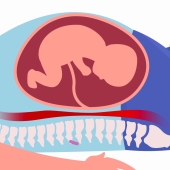Biology is crystal clear that at the moment of conception (also known as fertilization), a unique organism comes into existence. Since this new life possesses human DNA and is the offspring of human parents, it can legitimately only be described as human life.
Since there can be no question that human zygotes, embryos and fetuses are alive, some have attempted to claim that human beings are not "persons," until some threshold is crossed, such as viability, the capacity to feel pain, birth, or even the first year after birth. The merits of such notions can be debated, but it should be clear that they are not based on science but rather on ideology, philosophy or belief.
As far as observable science is concerned, human life begins at conception.
What happens at the moment of conception?
At the moment of conception, a male sperm unites with a female ovum. The single-celled entity formed by the sperm and oocyte (egg) is known as a zygote.
At conception, the zygote has 23 pairs of chromosomes and approximately 50,000 genes from each parent, which combine to determine all of one's physical characteristics, including sex, facial features, body type, and color of hair, eyes, and skin.
Many stages of prenatal development can be identified, especially in the early days and weeks of life when change takes place at an extremely rapid pace. The following are the primary stages:
Zygote: A single-celled human being from the moment of conception until the first cell division.
Blastocyst: A human being possessing 40 to 150 cells in the shape of a tiny ball; the placenta will develop from the outer cells, while the body develops from the inner cells.
Embryo: A human being from the time of the first cell division up until approximately the eighth week of life.
Fetus: A human being from about the eighth week of life up until birth.
Prenatal development and pregnancy can also be divided into trimesters:
First Trimester: From conception to 12 weeks gestation
Second Trimester: From 13 through 27 weeks gestation
Third Trimester: From 28 weeks gestation to birth
Source: http://prolifeaction.org/faq/unborn.php
- 2250 views













